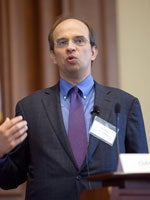Two years after considering the possibility of work stoppages in major league sports, the annual Harvard Law School Sports Law Symposium this year examined unresolved issues in the aftermath of collective bargaining agreements, as well as the ongoing problems of concussions and performance-enhancing drugs.
Panels on collective bargaining in Major League Baseball, the National Basketball Association, and the National Football League featured player agents and attorneys for teams, players’ associations, and leagues (for a complete list of panelists, see http://harvard2012sportslawsympsoium.eventbrite.com/ ).
In the conference keynote address, David Feher, outside counsel for the NFL Players Association and NBA Players Association for nearly 20 years, recounted negotiations he was involved in that shaped the nature of sports leagues today.
“When you look at the history of professional sports over the last 20 years,” he said, “it’s a series of battles, a series of choices, and a series of unintended consequences.”
For example, he noted that NFL ownership once fought against free agency. Yet the advent of free agency in the ’90s not only rewarded undervalued players, he said, it made the league itself more valuable, increasing its popularity by giving all fans hope that their team could win.
“We ended up fighting for the competition that I think lit a fire under the NFL for the past 20 years,” he said.
Also involved in the recent NFL collective bargaining that threatened the 2011 season, Feher said the owners at first demanded that the players give up a large percentage of their share of revenues. Eventually, however, players agreed to much smaller changes in their salary cap in exchange for other issues of importance to players, including changes in practice and other work rules. The lesson, he said, was that both sides must make compromises in order to sustain a long-term relationship such as that between players and owners.
A panel on the concussion crisis in professional sports, moderated by HLS Lecturer on Law Peter Carfagna, included medical experts in the field as well as three former professional players. Dr. Robert Cantu, co-director of the Center for the Study of Traumatic Encephalopathy at Boston University, offered background on the cause and nature of concussions as well as the condition Chronic Traumatic Encephalopathy, whose symptoms are similar to Alzheimer’s and develop as a result of multiple blows to the head. Most of the brains have been studied at the VA/ BU Brain Bank that have been donated by athletes who typically died prematurely. They reveal signs of CTE, he said. Dr. Judith Edersheim ’85, co-director of the Massachusetts General Hospital Center for Law, Brain and Behavior, spoke about medical treatment of concussions, which have physical, cognitive, and emotional effects, such as severe headaches and the feeling of what many describe as being in a fog, she said.
Former players who endured that experience spoke of ways to mitigate the prevalence of concussions. Tim Fleiszer, now a sports agent, said that he suffered 30 to 60 concussive episodes as a player in the Canadian Football League. Even in the most serious episode, he said, “It was pretty much laughed off by everybody, and I played the following week.” Now he works with teams to ensure that they respond properly, removing concussed players from games and giving them proper rest to recover.
Mark Moore, whose NHL career ended because of a concussion and whose brother Steve suffered a career-ending injury as a result of an attack during a game, said that bigger players, greater speed of the game, and the relatively small rink size in the NHL have contributed to the problem. His response to this problem is that he advocates switching to a 4-on-4 play from special situations to full time, as it has been calculated that this would cut concussions by more than half. An advocate of banning fights from the game, he also pointed to the governance of a sport in which “illicit violence that goes on is effectively tolerated too often.”
Shawn Stuckey, a former NFL player and now an attorney who represents retired players in a suit against the NFL Players Association, cited the preponderance of retired players who suffer from complications and brain injuries. The league should provide more pension money and programs to support these players, he said. Yet even players themselves often don’t take the concussion problem seriously enough, he acknowledged. “The players on the field are looking at it from a shorter-term perspective,” he said. Fleiszer echoed the point: “To get to where they’ve gotten to, there has to be a certain disregard for their injuries and their health.”
